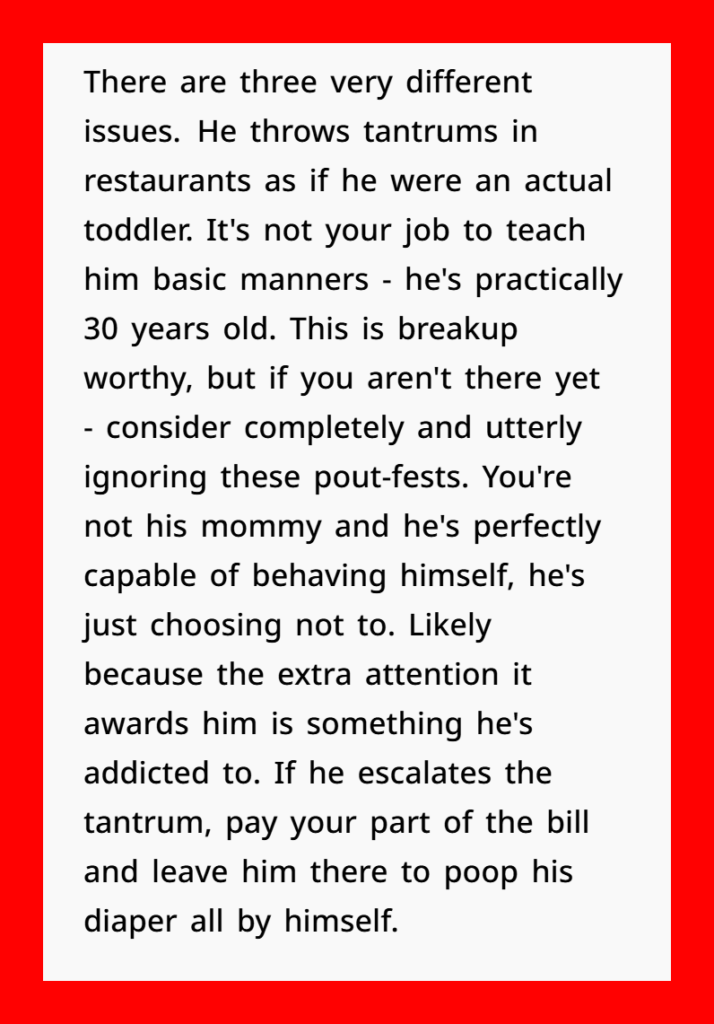Guy Throws Tantrums at Restaurants After Misunderstanding His Order, Leaving Girlfriend Fed Up
Dining out is often considered a shared experience meant to foster connection, conversation, and enjoyment. However, when one partner repeatedly misinterprets menu items and reacts with public frustration, the situation shifts from pleasant to painfully awkward. A 27-year-old woman recounts how her 29-year-old boyfriend’s repeated outbursts in restaurants—stemming from his own assumptions about the menu—leave her embarrassed and emotionally drained.
From misunderstanding a perfectly crafted espresso macchiato to expecting eggs in a veggie cheese sandwich, his lack of attention to detail and unwillingness to understand basic culinary terms creates constant friction. Despite patient explanations and gentle guidance, his refusal to learn or take accountability now raises deeper questions about respect, emotional maturity, and how to navigate relationship challenges like communication issues in public settings.
A guy kept embarrassing his girlfriend in restaurants by repeatedly not understanding what he was ordering

The woman felt she couldn’t take it anymore, and sought some relationship advice













Understanding the Psychological Impact of Public Outbursts
Frequent public embarrassment due to a partner’s behavior is often linked to deeper relationship dissatisfaction. According to a study published in the Journal of Social and Personal Relationships, repeated exposure to a partner’s negative public behavior can erode emotional intimacy and trust. Embarrassment triggers a stress response, leading to anxiety, avoidance of future public outings, and internalized resentment—factors that, if unresolved, contribute significantly to relationship breakdowns.

The Importance of Emotional Intelligence in Dining Etiquette
Dining etiquette is not just about manners; it reflects emotional intelligence—the ability to regulate emotions and respond appropriately in social settings. A partner who frequently lashes out due to unmet expectations demonstrates a lack of self-awareness and poor emotional regulation. Such behavior may also indicate cognitive biases like the “illusion of transparency,” where he assumes his interpretation of a menu should align with reality, leading to frustration when it doesn’t.
Furthermore, menu literacy—the ability to read, interpret, and understand a menu—is essential for any adult navigating modern dining experiences. Restaurants, especially those focusing on specialty coffee or gourmet brunches, often use industry-specific terms that require a baseline knowledge. Refusing to engage with the menu not only creates unnecessary conflict but also signals a disregard for the partner’s comfort and the social contract of dining out.
Legal and Industry Perspective: Consumer Responsibility in Ordering
From a consumer rights perspective, while customers are entitled to receiving what they order, responsibility also lies with the consumer to understand what they are requesting. In cases where the food or beverage served matches the menu description, legal recourse is limited. For example, misunderstanding a macchiato—traditionally a shot of espresso with a small amount of milk foam—does not justify a complaint if the drink was correctly prepared. Demanding a refund or making a scene could even violate a restaurant’s code of conduct policies.
Restaurant workers, particularly in the hospitality industry, frequently face such misunderstandings, leading to burnout and poor customer service experiences. Regularly causing scenes due to misinterpretation not only damages the couple’s dynamic but also contributes to the larger issue of mistreatment toward service staff—a significant ethical concern in dining culture today.

Effective Strategies to Address the Behavior
Handling this behavior requires a blend of conflict resolution skills and setting firm boundaries. Some potential solutions include:
- Pre-meal clarification: Encouraging him to ask questions or verify menu items with servers beforehand.
- Culinary education: Suggesting basic resources or coffee workshops to familiarize him with common food and drink terms—an investment that could pay off in reduced conflict and improved social confidence.
- Therapeutic intervention: If the outbursts stem from deeper issues such as control tendencies or poor impulse control, relationship counseling could be beneficial.
Conclusion: Choosing Emotional Safety Over Repeated Embarrassment
Repeatedly enduring public scenes over trivial misunderstandings like coffee orders or sandwich ingredients may seem minor but often signals broader patterns of disrespect and emotional immaturity. Addressing the issue sooner rather than later is crucial—not just for the health of the relationship but for maintaining dignity, emotional well-being, and respect for others in shared social spaces. If behavior remains unchanged, it raises a vital question: is the relationship fostering emotional safety or continually undermining it?
Some people couldn’t believe a grown man could act like this












